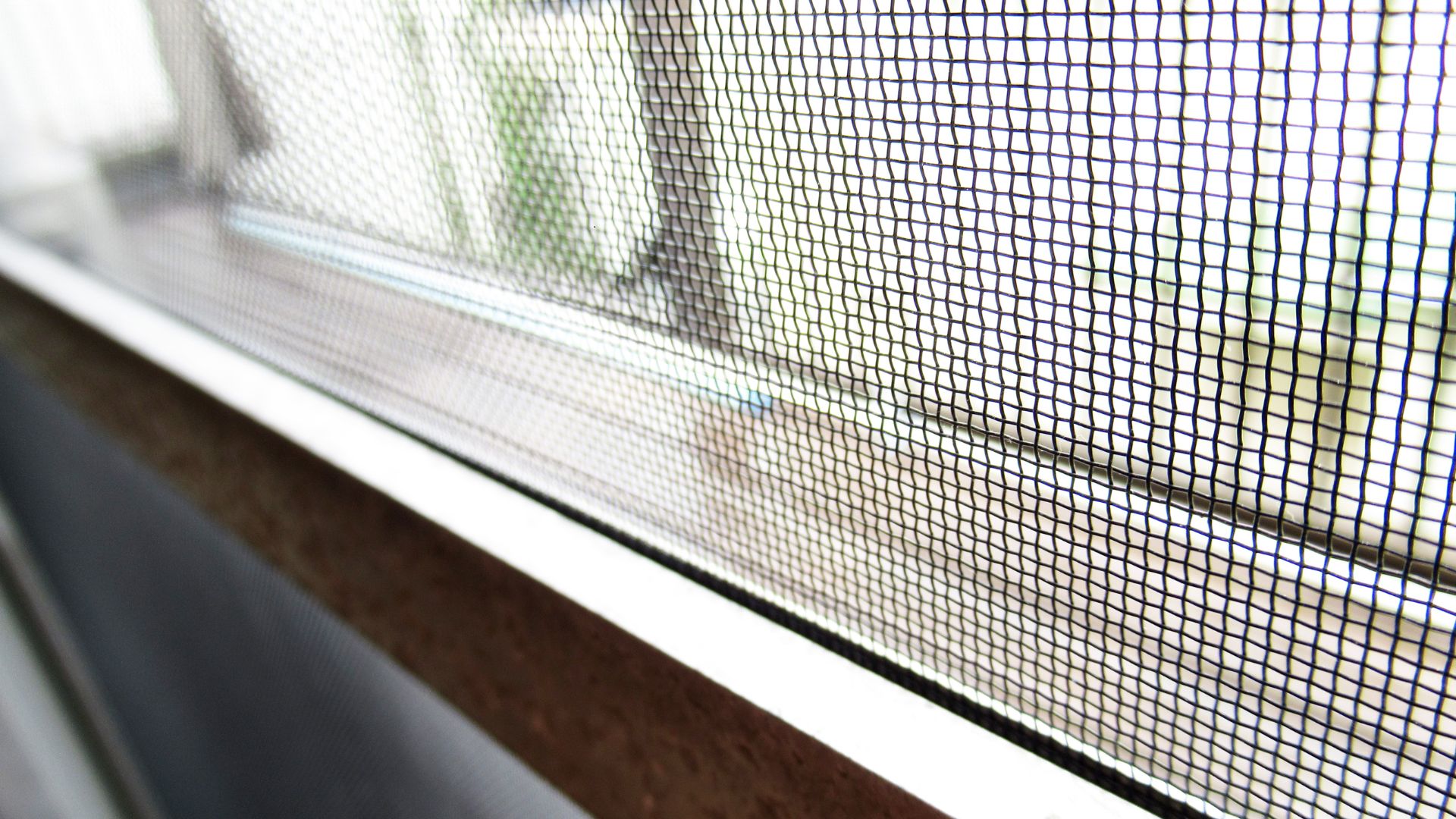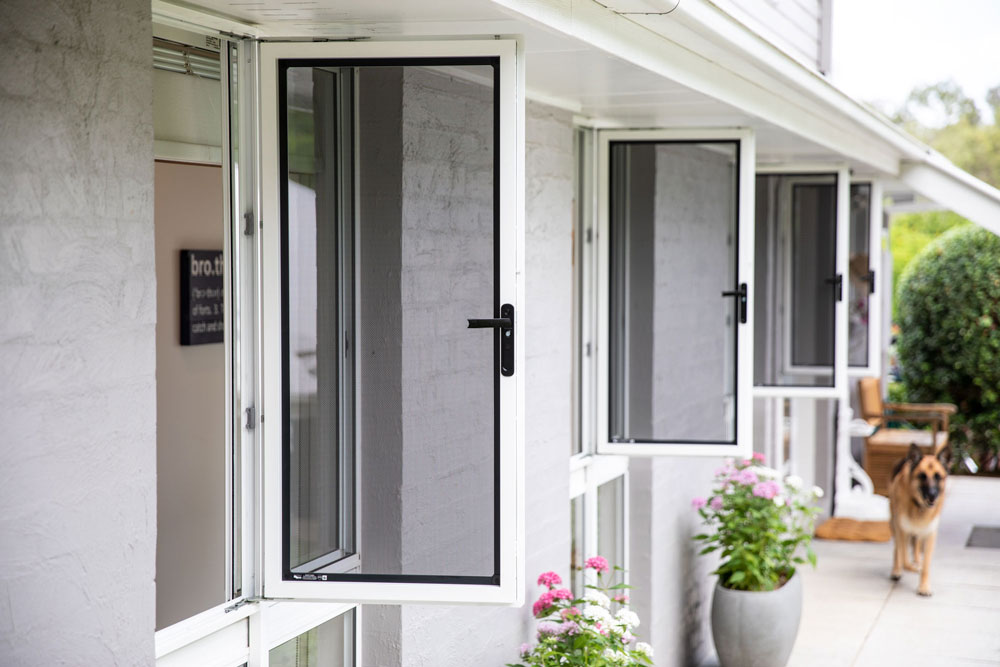Security screen doors and windows are a fantastic way to protect your home from unwanted intruders while allowing the breeze to flow into your home. However, if it’s been a while since you last cleaned them, that same breeze could also be carrying dust, pollen and dirt into your home, affecting your indoor air quality and reducing the lifespan of your security doors and window screens.
In this step-by-step guide, we’ll show you how to clean security screen doors and windows so that they sparkle like new and your home makes a great first impression on visitors.
Why Cleaning Your Security Screens Matters
Keeping your security screens free of spider webs, salt spray, pollen, and dust build-up will help to prolong their lifespan. Dust and debris build-up encourages corrosion, mould and bacteria growth, causing your security screens to deteriorate faster.

Another reason to keep them clean is an obvious one – dirty screens don’t look great. Your front security door is the thing your visitors will see first as they enter your home, so if you want to make a great first impression, you need to give the security screen mesh and surrounds a thorough clean regularly.
Dirty security and insect screens can also affect how well you can see through them, particularly with a product such as Prowler Proof’s Protec security screens, which are designed to allow maximum natural light and visibility. They can also affect the amount of airflow that’s entering your home if the dirt and dust have really built up.
With regular cleaning, your security screens will last longer, work more effectively, and you’ll ensure that your warranty remains valid.
What You’ll Need Before You Start
- Microfibre cloth or a vacuum cleaner
- Soft-bristled brush or sponge
- Mild detergent, bucket and warm water
- Gloves and a mask if allergic to dust
Step-by-Step: How to Clean Security Screens Properly
Doors and Windows
- Use a soft cloth to wipe over the entire screen to remove loose dirt and dust. If you wish to use a vacuum cleaner, use a soft brush head to avoid scratching or denting the screen. If the screen is very dirty, you can spray it directly with a garden hose, but never use a pressure washer, as this may damage the coating.
- Use a soft-bristled brush or sponge dipped in your cleaning solution of warm water and mild detergent to gently scrub any stuck-on grime, marks and salt deposits. Avoid using steel wool, scratch pads or powders as these can also damage the coating surface.
- Rinse your brush or sponge, empty your bucket and fill it with clean water to give your security screens a final rinse. You can then wipe it over with a dry cloth so that they don’t remain moist.
Locks, Hinges and Rollers
- Avoid damaging moving parts by using a soft, clean cloth dipped in the same solution as above to clean the surface of locks, hinges and rollers. It’s important to ensure that liquid doesn’t penetrate the lock cylinder, as this can damage it, so always squeeze your cloth well to ensure there are no drips.
- Lubricate key cylinders annually to ensure smooth operation. Powdered graphite is a good choice because it’s dry, so it doesn’t attract dust and dirt like oil-based lubricants. You simply apply a small amount to the key and insert it into the lock barrel.
Special Care Tips for Different Materials
Not all security screening materials withstand the elements equally. When it comes to caring for your screens, consider both the type of mesh and the frame materials.
For example, Prowler Proof’s Forcefield range is made of stainless-steel mesh, but, unlike other brands of security screens that use pop rivets or screws that can quickly corrode, it’s welded together to offer superior strength over time. The Prowler Proof Forcefield range also uses 316 marine-grade stainless steel mesh, which is far more durable, especially in harsh coastal conditions.
What to avoid when cleaning security screens
One important tip when cleaning any type of security screen is to avoid the use of harsh chemicals and high-pressure hoses, which can compromise the powder coating and protective layer, leaving it susceptible to corrosion.
How Often Should You Clean Security Screens?
Follow the simple steps above to maintain security screen doors and windows at the intervals listed below, based on your living environment. Those living in coastal environments or near industrial areas will need to clean screens more frequently to prevent dust and salt from degrading the screening material.

When to Call a Professional
If exposed to salty air, moisture and dust for extended periods of time, security screens can become stained or discoloured. If you find that you cannot remove a stain with a gentle cleaning solution, it may be a sign of damage to the protective coating material, and you should contact a professional, as your home security may be compromised.
Similarly, if the mesh or frame is damaged, or you’ve been let down by security screens made of inferior materials that have begun to rust, it’s probably best to replace your doors and window screens with a strong and durable product that can protect your home adequately.
It’s also important to note that routine professional servicing of your security doors and windows can help to extend their life. If your door becomes stuck when opening or closing, or the hinges, latches and handles are worn, it’s best to call for professional assistance as these issues can affect the effectiveness and strength of your security door.

Final Tips for Long-Term Maintenance
Security screens are an effective method for deterring burglars, but only if they appear strong and well cared for. Thieves are much less likely to be deterred by a screen door that’s covered in spider webs and held together by rusty screws.
Take the time to regularly inspect your screen doors and windows for signs of wear and tear, wipe them over with a soft brush when you’re dusting, and if they are at the end of their life, replace them as soon as possible.
If you’re on the Sunshine Coast, East Coast Security Screens can provide you with a free measure and quote so you can throw open those doors and windows during the summer months and rest assured your family home is protected. Contact us on 0407 147 393 or visit our website to view our full range of security screens.
FAQs
How do you clean dirty security screens?
Wipe the dust off with a microfibre cloth, sponge clean with warm water and mild detergent, use clean water and a damp cloth to rinse and then use a dry cloth to wipe away the moisture.
How to clean Crimsafe mesh?
To clean Crimsafe mesh and other brands of security screens, you just need to remove loose dirt before wiping over with a mild cleaning solution, then rinse and dry.
Does WD-40 really clean screens?
You should never use WD-40 to clean screen doors because it will leave a residue that will attract dirt. WD-40 is also a solvent, so it may affect the protective coating, depending on what your screen is made of.
How do you clean mesh screens?
The most effective method for cleaning all types of mesh screens is to use a soft, clean cloth and a cleaning solution of warm water and mild detergent to gently wipe off dirt and grime.


